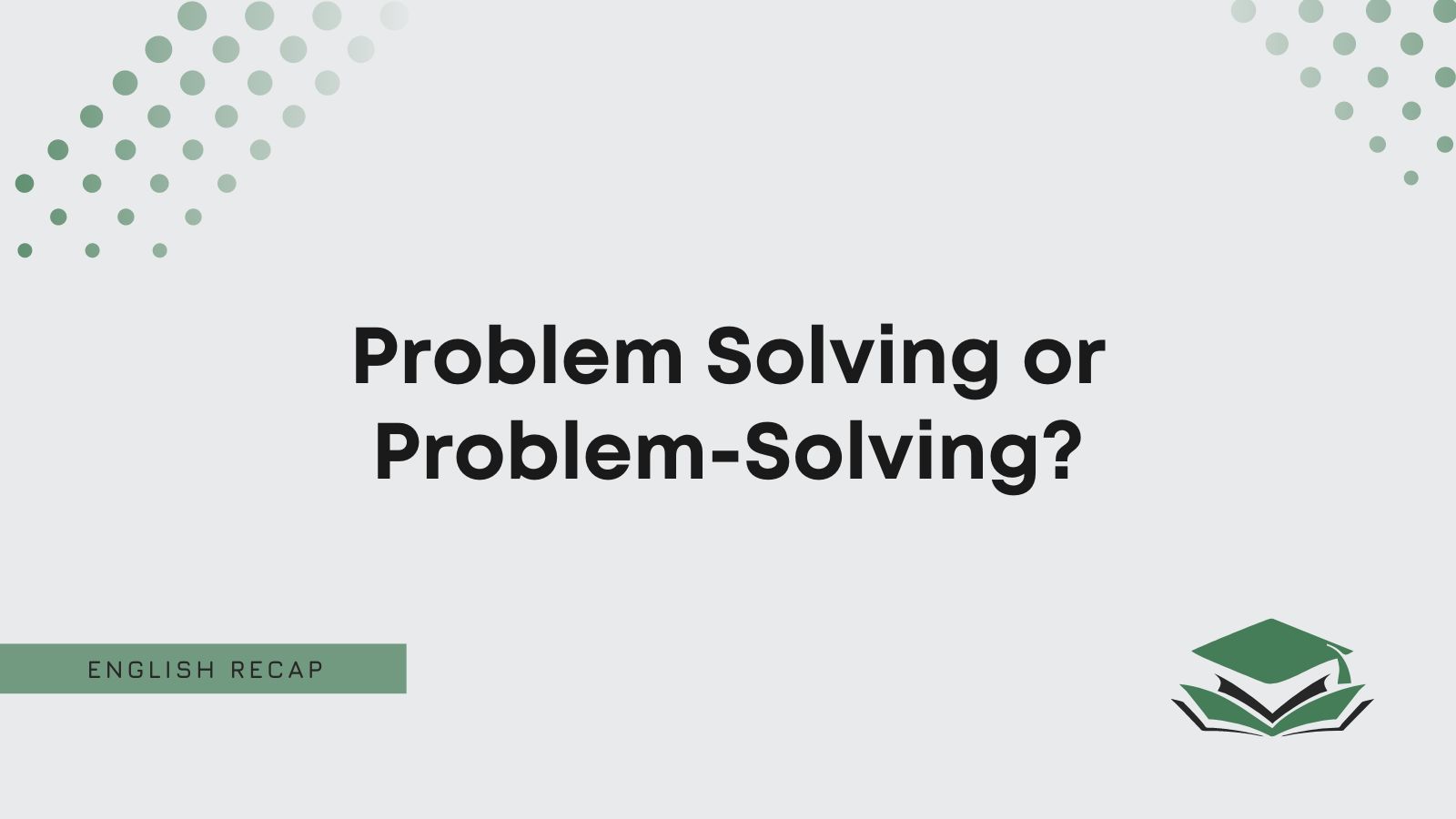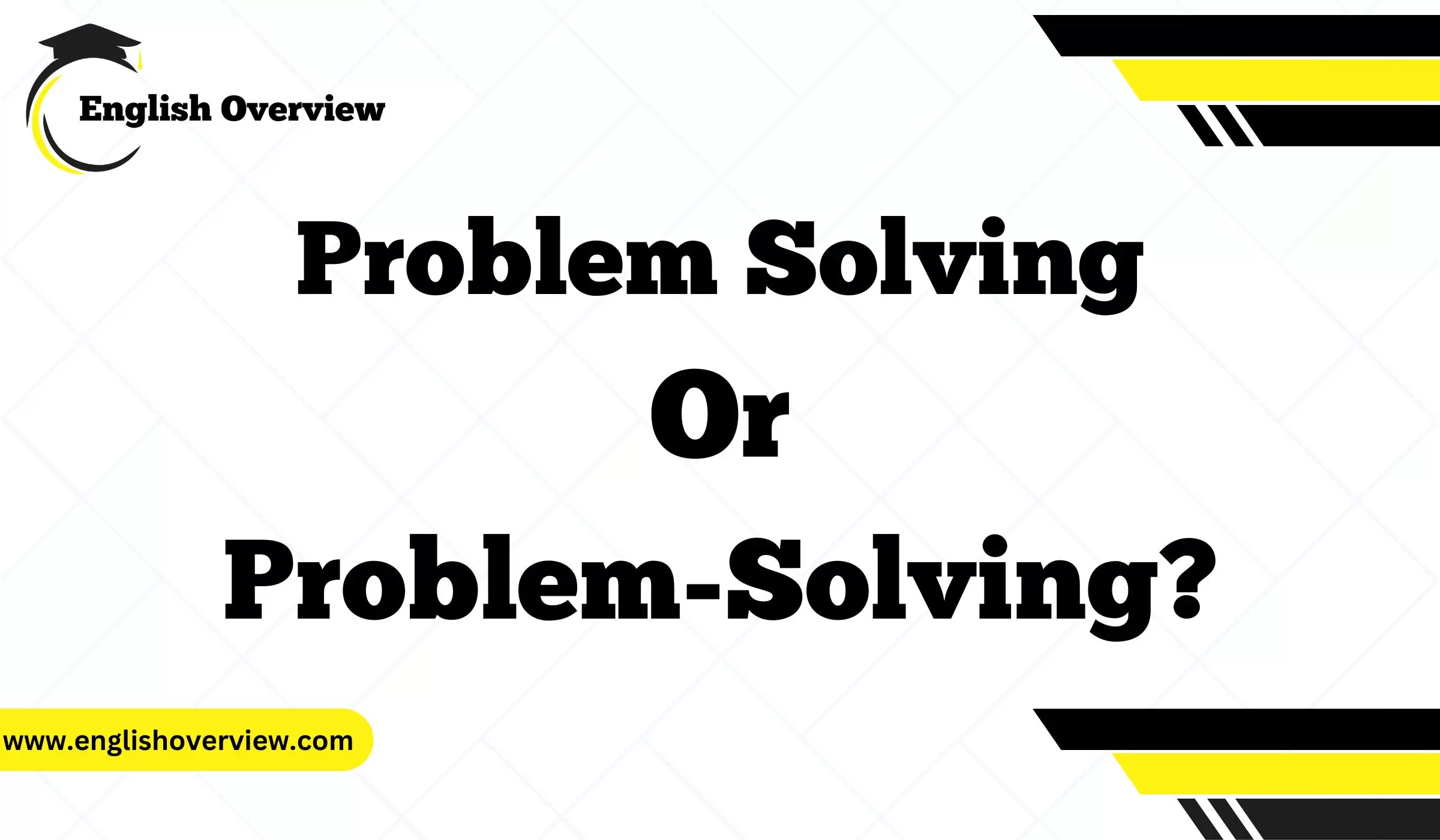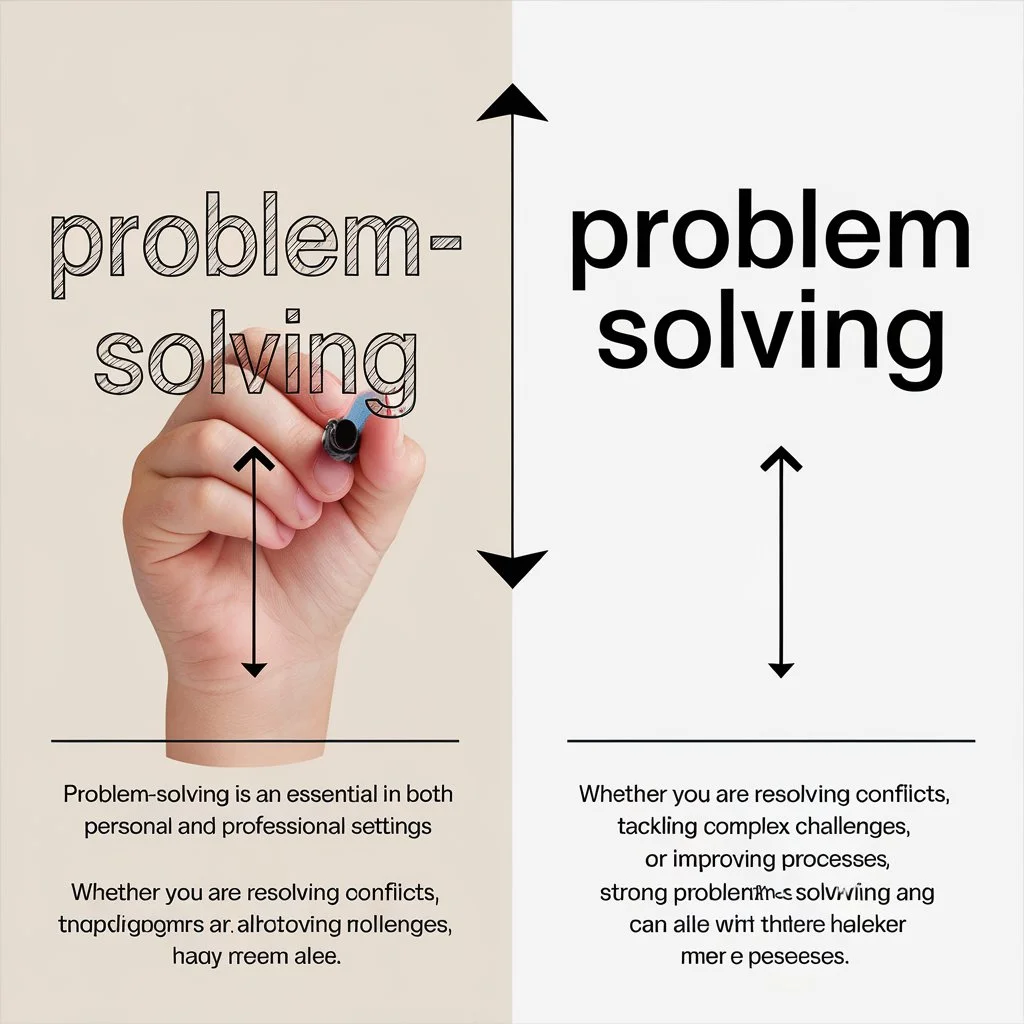

“Problem-Solving” Or “Problem Solving”? Learn If It Is Hyphenated
Is it problem-solving or problem solving? Hyphenation rules seem to be a little confusing when you’re first picking up a language. Don’t worry, though. They’re not nearly as complicated as the language may have led you to believe!
Problem-Solving Or Problem Solving – Hyphenated Or Not?
When we discuss the problem-solving hyphen rule, we learn that problem-solving is hyphenated when used to modify a noun or object in a sentence. We keep the two words separated when using them as their own noun and not modifying anything else in the sentence.
Examples Of When To Use “Problem-Solving”
Now that we’re into the whole debate of problem-solving vs problem solving, let’s look through some examples of how we can use “problem-solving” with a hyphen. As stated above, we use “problem-solving” when modifying a noun or object in a sentence. It’s the most common way to write “problem-solving.” Even the spelling without a hyphen is slowly being pushed out of common language use!
- This is a problem-solving class.
- I hold a problem-solving position at my workplace.
- My manager put me in charge of the problem-solving accounts.
- They say I have a problem-solving mind.
- We’re known as problem-solving children.
Examples Of When To Use “Problem Solving”
Though much less common to be seen written as a phrase noun, it is still worth mentioning. It’s grammatically correct to use “problem solving” at the end of a sentence or clause without a hyphen. However, as we stated above, many people are beginning to prefer the ease of sticking to the hyphenated spelling, meaning that it’s slowly phasing out of existence even in this form.
- I’m good at problem solving.
- This requires a lot of problem solving.
- We are all trained in problem solving.
- My job asks for problem solving.
- Did you say you were good at problem solving?
Is Problem-Solving Hyphenated AP Style?
Have you had a look through the rules in the AP stylebook before? Even if you haven’t, there’s a good explanation for hyphens there. As we stated above, we use hyphens when linking close words that modify a noun or object in a sentence. They’re used to help a reader better understand what is going on through the modification of the clause.
Should I Capitalize “Solving” In The Word “Problem-Solving”?
The question of “is problem-solving hyphenated” was answered, but now we’ve got a new question. What happens to capitalization rules when we add a hyphen to a title. It depends on your own title choices, so let’s look a little further into the three potential options. The first option capitalizes only the first word and any proper nouns in a title. In this case, neither word in “problem-solving” is capitalized.
The second option capitalizes all words except for short conjunctions, short prepositions, and articles. In this case, you will always capitalize “problem” but always leave “solving” uncapitalized. The final option capitalizes every single word in a title. No matter what, you’ll capitalize both words in “problem-solving” when using this style to write your titles.
Does The Rule Also Apply To “Problem Solver” Vs “Problem-Solver”?
The same rule does apply when we use “problem solver” instead of “problem solving.” However, it’s not often that we’ll see a “problem-solver” modifying a noun or object (unless it’s a problem-solver robot or something). So, it’s most likely you’ll write “problem solver.”
Alternatives To “Problem-Solving”
If you’re still struggling with the hyphen rule of whether it’s problem solving or problem-solving, there’s one last thing we can help you with. We can give you some alternatives that have the same meanings but don’t require a hyphen. This way, you can be safe in your own knowledge without having to worry about getting the rules wrong.
- interpretive
Quiz – Problem-Solving Or Problem Solving?
We’ll finish with a quiz to see how much you’ve learned from this article. The answers are all multiple choice, so you should have a blast with them! We’ll include the answers at the end to reference as well.
- I’ve been told that I’m good at (A. problem-solving / B. problem solving).
- I hold my (A. problem-solving / B. problem solving) skills close to my heart.
- We aren’t great at (A. problem-solving / B. problem solving).
- These are all the best (A. problem-solving / B. problem solving) subjects.
- Can we have a go at a (A. problem-solving / B. problem solving) puzzle?
Quiz Answers
- Chris’s or Chris’? Here’s The Correct Possessive (Helpful Examples)
- “Well-known” or “Well known”? (Hyphenation Rules & Best Practice)
- “On Campus” Or “On-Campus”? Learn If “On Campus” Is Hyphenated
- “Good looking” or “Good-looking”? Learn if “Good looking” is hyphenated

Hyphen Rules: Don’t Let Misused Hyphens Muddle Your Adjectives Or Your Writing
Mar 16, 2008 | Grammar and Usage , Proofreading , Punctuation
Rule 1: When compound adjectives come before a noun, the adjectives should be hyphenated.
Compound Adjective: two or more adjectives that work together to describe the same noun
Example 1: On Monday, Mrs. Thomas taught problem-solving skills to her class.
The compound adjective problem-solving tells what kind of skills Mrs. Thomas taught. Since these adjectives come before the noun and work together to describe the noun, it’s necessary to place a hyphen between them.
To understand why the hyphen is needed, remove it, then check the sentence’s meaning—it will be very different:
Example 2: On Monday, Mrs. Thomas taught problem solving skills to her class.
With no hyphen between the two adjectives, the writer’s meaning is unclear. Did Mrs. Thomas teach solving skills that were a problem ? Did she teach two types of skills to her class: problem skills and solving skills? Be sure that your punctuation reflects what you’re trying to say.
Also, watch for words that look like compound adjectives but are really separate, independent adjectives. Take a look at the following sentence:
Example 3: Stephen King is a successful, popular writer.
Here, successful and popular do not form a compound adjective; instead, they are two separate, independent adjectives describing writer , and a comma—rather than a hyphen—should be placed between them. Either word could be used by itself, and the sentence would make sense.
Rule 2: If the compound adjective comes after the noun it describes, no hyphen is needed.
Example 4: On Monday, Mrs. Thomas taught her class many skills, including problem solving .
Since problem solving follows the noun (skills), no hyphen is needed.
Sometimes writers may use what is called a suspending hyphen , a hyphen that is used when two or more adjectives have the same base element, and the base element is shown only with the last term. Consider the following examples:
Example 5: Although they couldn’t wait for their new furniture, Bill and Abby knew that there would be a three- to four-day delay in delivery.
Here, three and four share the base word day . The writer could have written three-day and four-day delay , but using the suspending hyphen creates writing that is more succinct and easier to read.
Example 6: Peter’s knowledge of the case was through second- and thirdhand information.
In this sentence, the hyphen after second tells the reader that second shares the same base element as thirdhand , which is, of course, hand . Again, using the suspending hyphen is more efficient than writing secondhand and thirdhand information .
So far, so good, right? Well, there is an exception to these basic hyphenation rules.
Rule 3: Do not hyphenate when the first of the two words ends in -ly.
Example 7: Maddie is an extremely overworked mother.
Extremely is an adverb. By definition, adverbs describe verbs, adjectives, and other adverbs. In this sentence, extremely is not describing mother (which is a noun) but is telling how overworked Maddie is. Therefore, no hyphen is needed between extremely and overworked .
Rule 4: Watch for special hyphenated nouns.
Example 8: She was the runner-up in the beauty contest.
Other examples can include mother-in-law (and the other in-laws), best-seller, follow-up, etc. When in doubt about a hyphenated noun (as opposed to a compound word, such as letterhead or freeway), don’t guess. It’s always best to look it up in Merriam-Webster’s Dictionary (our dictionary of choice).
Hyphens may be disappearing in some cases (thanks to the Internet), but if you proofread your work carefully and follow these basic rules, they won’t trip you up! Learn more about Writer’s Relief expert proofreaders ! And once your work is proofread, why not use Writer’s Relief’s expertise? We can help target the best markets and boost your odds of getting an acceptance or securing agent representation. Learn more about our services and submit your writing sample to our Review Board today!

Problem Solving or Problem-Solving?

The term problem-solving with a hyphen is an adjective that describes nouns in a sentence. E.g., “The problem-solving abilities of this program are excellent.” Furthermore, the term problem solving without a hyphen is a noun. E.g., “He is excellent at problem solving.”
The term problem solving can appear as two different word types, a noun or a compound adjective.
When problem-solving has a hyphen, it is an adjective describing a noun .
For example, in this sentence, problem-solving describes capabilities , which is a noun. Therefore, you need to include a hyphen.
- Her problem-solving capabilities are outstanding.
However, when you use problem solving as a noun , the term is usually not hyphenated because it doesn’t modify anything.
- She is an expert at all types of problem solving .
Furthermore, the rule of using a hyphen for the adjective but not for the noun is correct grammar according to AP Style and the Chicago Manual of Style .
Sometimes in English, the rules concerning punctuation, such as hyphens, are vague. For example, in the Cambridge and Oxford dictionaries, the noun problem-solving appears with a hyphen.
Essentially, you should always use a hyphen for the term problem-solving as an adjective. However, for problem solving as a noun, unless you follow a specific style guide like AP that does not use a hyphen, you can choose whether to hyphenate the noun. Just make sure that you are consistent with your choice.
In addition, Google Ngram shows that problem solving without a hyphen is slightly more popular in the US than with a hyphen. However, in the UK , the hyphenated version is slightly more frequent.
Now that you have learned the basics concerning the term problem solving, please keep reading the rest of the article to learn more about using the two variations of problem solving .
Problem Solving
The term problem solving as two words without a hyphen is the noun form.
In terms of use, it relates to resolving problems, which can relate to problems in a specific discipline or more general problems.
In the following examples, the term problem solving refers to the act of solving problems. Therefore, we do not need a hyphen.
- Her inability to perform problem solving on any task means that she loses her temper quickly.
- You should include problem solving as a skill on your resume.
- In team projects, effective problem solving can lead to innovative solutions and successful outcomes.
- Problem solving is not just about finding immediate answers but understanding the root cause of the issue.
- Her approach to problem solving often involves breaking down complex tasks into manageable steps.
Furthermore, you should use the above rule when following both AP Style or the Chicago Manual of Style.
Problem-Solving
The term problem-solving as one word with a hyphen is a compound word that appears before a noun. Hence, it modifies the noun .
For example, in the following sentence, the word problem-solving modifies the noun skills.
- His problem-solving skills are the best in the company.
- Her problem-solving approach is both methodical and creative, making her a valuable asset to the team.
- The workshop focuses on problem-solving techniques to address everyday challenges.
- Many employers prioritize candidates with strong problem-solving abilities in dynamic work environments.
- The game challenges children to use their problem-solving instincts to navigate various puzzles.
Furthermore, you will come across some sentences in which the noun problem solving has a hyphen.
As shown in these examples:
- You need to work on your problem-solving if you want to become an engineer.
- Improving your problem-solving is essential for success in mathematics.
- Mastering problem-solving will greatly benefit you in software development.
This is often a stylistic choice . However, in writing that follows AP Style , you should not use a hyphen with the noun form of problem solving.
Problemsolving
The word problemsolving as a single word with no hyphen or space is incorrect , and you shouldn’t use it in this format.
There are two ways you can use the term problem solving .
The first is as a noun, in which case there is no hyphen, but there is a space.
- Correct: He is excellent at problem solving because he never gives up. (noun)
- Incorrect: He is excellent at problemsolving because he never gives up. (noun)
- Correct : She has a knack for problem solving , especially in high-pressure situations. (noun)
- Incorrect : She has a knack for problemsolving , especially in high-pressure situations. (noun)
Also, you can write problem-solving as an adjective, in which case you need a hyphen.
- Correct: He is excellent at problem solving because he never gives up. (adjective)
- Incorrect: He is excellent at problemsolving because he never gives up. (adjective)
- Correct : They often turn to her for advice on problem solving in challenging situations. (adjective)
- Incorrect : They often turn to her for advice on problemsolving in challenging situations. (adjective)
That’s all you need to know about the grammar rules concerning the words problem solving , problem-solving , and problemsolving . Rest assured that your sentences will be correct if you follow these!
- Half Day or Half-Day?
- Well Deserved or Well-Deserved?
- Well Written or Well-Written?
- World Class or World-Class?
We are a team of dedicated English teachers.
Our mission is to help you create a professional impression toward colleagues, clients, and executives.
© EnglishRecap

Problem Solving or Problem-Solving?
The term “Problem-Solving” or “Problem Solving” often takes center stage in discussions about overcoming challenges. However, the nuances in its usage can be perplexing. This exploration aims to dissect the word, observing its forms as a noun, adjective, and verb. Through five examples for each category, we’ll emphasize correct spelling and punctuation, while delving into the importance of adhering to grammar rules.
The focal point will be the distinction between “Problem Solving” as a verb phrase, “Problem-Solving” as a hyphenated adjective or noun, and the incorrect form “Problem Solving.” Furthermore, we’ll highlight the consistency in usage between UK and US English.
The Noun Form: Problem-Solving
Correct examples.
- Effective problem-solving requires a systematic approach.
- The team showcased remarkable problem-solving skills during the crisis.
- Our workshop focused on collaborative problem-solving techniques.
- She excelled in the art of creative problem-solving .
- The conference highlighted the importance of collective problem-solving efforts.
Incorrect Examples
- Effective problem solving requires a systematic approach.
- The team showcased remarkable problem solving skills during the crisis.
- Our workshop focused on collaborative problem solving techniques.
- She excelled in the art of creative problem solving .
- The conference highlighted the importance of collective problem solving efforts.
Note: The correct noun form is “problem-solving” with a hyphen.
The Adjective Form: Problem-Solving
- The problem-solving approach proved successful in the project.
- Her problem-solving mindset made her an asset to the team.
- A problem-solving mindset is crucial for navigating challenges.
- The group showcased effective problem-solving techniques.
- They developed innovative problem-solving strategies.
- The problem solving approach proved successful in the project.
- Her problem solving mindset made her an asset to the team.
- A problem solving mindset is crucial for navigating challenges.
- The group showcased effective problem solving techniques.
- They developed innovative problem solving strategies.
Note: When used as an adjective, “problem-solving” should be hyphenated.
Read More: In Person or In-Person?
The Verb Form: Problem Solving
- The team collectively worked on problem solving for the project.
- She excels in problem solving by breaking down complex issues.
- They actively engage in collaborative problem solving .
- The committee is dedicated to effective problem solving .
- The approach involves strategic problem solving .
- The team collectively worked on problem-solving for the project.
- She excels in problem-solving by breaking down complex issues.
- They actively engage in collaborative problem-solving .
- The committee is dedicated to effective problem-solving .
- The approach involves strategic problem-solving .
Note: The correct verb form is “problem solving” without a hyphen.
Importance of Grammar Rules
Adhering to grammar rules is paramount for effective communication. Consistency in the use of hyphens, especially in words like “problem-solving,” ensures clarity and maintains the intended meaning. Proper grammar also contributes to professionalism in written and spoken communication.
Consistency in UK and US English
The usage of “problem-solving” remains consistent between UK and US English. Regardless of geographical location, the hyphenated form is universally accepted and preferred.
In conclusion, understanding the nuances of “Problem-Solving” versus “Problem Solving” is vital for clear and effective communication. The correct usage varies depending on whether it functions as a noun, adjective, or verb. Adhering to grammar rules, including the proper placement of hyphens, enhances the precision of language.
The consistency in usage across UK and US English simplifies the application of these rules globally. So, whether discussing strategies, approaches, or mindsets, the choice between hyphenation and separation holds significance in conveying the right message.

Dariel Campbell is currently an English instructor at a university. She has experience in teaching and assessing English tests including TOEFL, IELTS, BULATS, FCE, CAE, and PTEG . With over a decade of teaching expertise, Dariel Campbell utilizes his knowledge to develop English lessons for her audience on English Overview.
Leave a Comment Cancel reply
You must be logged in to post a comment.
Welcome to The English Overview, where we help to improve your language skills. Explore lessons on words, sentences, punctuation, and more. Enhance your English fluency and easily create powerful expressions. Come along on a journey to become excellent in language.
Privacy Policy
Latest Articles

5 Tips to Prepare Yourself for an English Literature Degree
December 23, 2024

The Future of Factory Automation and Its Impact on Productivity

The Role of Diet in Blood Pressure Fluctuations
December 22, 2024
© 2024 English Overview

“Problem-Solving” Or “Problem Solving”|What Is The Difference
Problem-solving is an essential skill in both personal and professional settings. Whether you are resolving conflicts, tackling complex challenges, or improving processes, strong problem-solving abilities are highly valued. The hyphenation of problem-solving can sometimes be confusing, but it follows specific rules depending on how it is used in a sentence. Understanding when to hyphenate problem-solving can make your writing clearer and more precise. In this guide, we will explore when to use problem-solving with and without a hyphen, as well as some helpful alternatives.
Hyphenation rules can be confusing, especially when you’re first learning a language. However, once you understand the basics, you’ll find that they’re not as complicated as they might seem.
Table of Contents
Problem-Solving or Problem Solving – Which is Correct?
When it comes to the use of problem-solving , the rule is simple: problem-solving is hyphenated when it’s used to modify a noun or object in a sentence. On the other hand, problem solving (without a hyphen) is used when the phrase acts as a noun on its own, not modifying anything else.
Examples of When to Use Problem-Solving
Now that we’ve discussed the differences, let’s go through some examples of how to use problem-solving (with a hyphen) in sentences. As mentioned earlier, problem-solving is used when it modifies a noun or object. It’s the most common form, and in modern usage, even the non-hyphenated version is becoming less popular.
- This is a problem-solving class.
- I hold a problem-solving position at my workplace.
- My manager put me in charge of the problem-solving accounts.
- They say I have a problem-solving mind.
- We’re known as problem-solving children.
- She excels in problem-solving tasks at her company.
- The problem-solving approach helped the team resolve issues quickly.
- This is a problem-solving workshop designed to enhance critical thinking.
- We use a problem-solving model to address complex challenges.
- His problem-solving skills impressed the hiring committee.
- The school implemented a problem-solving curriculum to teach students analytical thinking.
- My supervisor praised my problem-solving ability during the meeting.
- She was promoted to a problem-solving role in the technical department.
- The software includes several problem-solving tools to assist users.
- Their problem-solving strategies were effective in managing the crisis.
- A good leader needs strong problem-solving capabilities.
- They attended a problem-solving seminar to improve collaboration.
- Her problem-solving techniques helped reduce production delays.
- The team used a problem-solving framework to handle customer complaints.
- He developed a unique problem-solving method to overcome technical barriers.
Examples of When to Use Problem Solving
Although much less common, problem solving (without the hyphen) is still grammatically correct when used as a phrase noun, usually appearing at the end of a sentence or clause. However, as noted earlier, the hyphenated form is becoming more widely accepted and used.
- I’m good at problem solving .
- This requires a lot of problem solving .
- We are all trained in problem solving .
- My job asks for problem solving .
- Did you say you were good at problem solving ?
- I’m really good at problem solving under pressure.
- She enjoys problem solving and often helps her colleagues with complex tasks.
- Problem solving is an essential skill in this industry.
- They focused on problem solving during the training session.
- His job involves a lot of problem solving every day.
- Problem solving requires patience and creativity.
- We practiced problem solving exercises in the workshop.
- She has a natural talent for problem solving .
- The project will require some intensive problem solving .
- He took a course on effective problem solving techniques.
- Problem solving helped them overcome the challenges they faced.
- The meeting was dedicated to group problem solving .
- Our team excels in collaborative problem solving .
- She uses logical reasoning in her problem solving process.
- We need to improve our problem solving to meet the deadline.
Is “Problem-Solving” Hyphenated in AP Style?
Yes, it is! If you’ve reviewed the AP Stylebook , you’ll notice that it provides clear guidelines on when to use hyphens. The hyphen is used to connect words that modify a noun or object in a sentence, helping to ensure clarity. So, in AP Style, problem-solving is hyphenated when used as an adjective.
- The problem-solving team addressed the issue quickly.
- She was recognized for her problem-solving efforts in the project.
- A problem-solving approach is critical in customer service.
- The company values employees with strong problem-solving skills.
- We attended a problem-solving seminar last weekend.
- His problem-solving attitude helped resolve the conflict.
- A problem-solving mindset is key to success in this role.
- They developed a problem-solving tool to improve efficiency.
- The problem-solving techniques we learned were effective.
- Their problem-solving abilities were tested during the crisis.
- A problem-solving exercise was included in the interview process.
- The problem-solving strategies outlined in the manual were helpful.
- We used a problem-solving framework to handle the challenges.
- Her problem-solving capacity made her a valuable asset to the team.
- The new hire excelled in problem-solving scenarios during training.
Should I Capitalize “Solving” in “Problem-Solving”?
When it comes to capitalization in titles, the answer depends on the style you are following. There are three main approaches:
- Example: We attended a class on problem-solving .
- Example: The Guide to Problem-Solving .
- Example: An Introduction to Problem-Solving .
Does the Rule Apply to “Problem Solver” vs. “Problem-Solver”?
The same hyphenation rule applies when we use “ problem solver ” instead of “ problem solving .” That is, you’ll use problem-solver with a hyphen when it modifies a noun or object. However, you’ll more commonly see “ problem solver ” without a hyphen, as it typically doesn’t act as a modifier.
Alternatives to “Problem-Solving”
If you’re still unsure about using problem-solving or problem solving , you can opt for alternative words that convey the same meaning without requiring a hyphen. Some great alternatives include:
- Interpretive
Quiz – Problem-Solving or Problem Solving?
Now, let’s test what you’ve learned with a quick quiz! Choose whether the sentence requires problem-solving (hyphenated) or problem solving (not hyphenated).
- I’ve been told that I’m good at (A. problem-solving / B. problem solving ).
- I hold my (A. problem-solving / B. problem solving ) skills close to my heart.
- We aren’t great at (A. problem-solving / B. problem solving ).
- These are all the best (A. problem-solving / B. problem solving ) subjects.
- Can we have a go at a (A. problem-solving / B. problem solving ) puzzle?

Quiz Answers
- B – problem solving
- A – problem-solving
What is problem-solving?
Problem-solving is the process of identifying a problem and coming up with ways to fix it. It involves using logical thinking, creativity, and sometimes teamwork to reach a solution. In many jobs, strong problem-solving skills are important for handling challenges or unexpected issues. Good problem-solving can improve efficiency and help achieve goals faster.
When should I use “problem-solving” with a hyphen?
Use problem-solving with a hyphen when the phrase is used to describe or modify a noun. For example, in sentences like “ problem-solving techniques” or “ problem-solving mindset,” the hyphen links the two words to show that they act together as a single idea describing the noun. This hyphenated form is used when problem-solving is an adjective in a sentence.
Can “problem solving” be used without a hyphen?
Yes, problem solving without a hyphen is used when the phrase is a noun on its own. For example, in “He’s great at problem solving ,” it’s acting as the subject of the sentence. When problem solving is not describing another word, it doesn’t need a hyphen. This form is used less often but is still grammatically correct.
Is “problem-solving” hyphenated in AP Style?
Yes, in AP Style, problem-solving is hyphenated when it functions as an adjective describing a noun. For example, in a sentence like “She led the problem-solving session,” the hyphen connects the two words to clarify their function as a modifier. AP Style recommends using hyphens in compound adjectives like this to ensure clarity for readers.
What are some alternatives to “problem-solving”?
Some alternatives to problem-solving include terms like analytical thinking , rational thinking , critical thinking , or troubleshooting . These words refer to different methods of addressing and resolving challenges or issues. Each of these alternatives highlights specific approaches to understanding and solving problems effectively, and they can be used to avoid overusing the term problem-solving .
Final words
In conclusion, understanding when to use problem-solving with or without a hyphen can significantly improve clarity in your writing. Using problem-solving as a hyphenated adjective helps modify and describe specific nouns, while problem solving without a hyphen works as a standalone noun. By mastering these simple rules, you enhance your communication, especially in professional and academic settings. Developing strong problem-solving skills and knowing how to express them effectively is key to success in many areas of life.

I’m Mira Sinclair , the expert helping you navigate grammar sections at “ Grammer Grove .” Playing with words and expressions is my thing. At Grammer Grove, we’re here to make yourwriting stand out and shine. Let’s make your appreciation heartfelt and memorable—come and join the fun at Grammer Grove!
Leave a Comment Cancel reply
Save my name, email, and website in this browser for the next time I comment.

I’m Emily Harper ,
Let me take you on a journey through the heart of Anniversaryjourney , uncovering hidden gems and showcasing the It's rich culture .
Whether it’s local lore or must-visit spots, count on me to make your adventure unforgettable .
Recent Posts

Can You Start a Sentence with Yet

Inspiring or Inspirational|Examples & Difference

Say Your Peace” or “Say Your Piece|which is it

More Friendly” Or “Friendlier|Which is Correct

Requester or Requestor|Which Spelling to Use

“Leave It As It Is” Or “Leave It As Is|The Correct Version

Is “Agreeance” A Proper Word In English|Explained With Examples

Li’l or Lil’ or ‘Lil | Correct Spelling
Make your grammer knowledge stand out and shine
Privacy Policy
Latest Articles

October 14, 2024

October 12, 2024

- Grammar Rules
- Writing Skills
- Speaking & Pronunciation
- Idioms & Expressions
- Common Mistakes
- Practice Exercises
- Test Preparation
- Business English
- Academic English
- Cultural Context
- Digital Communication
- Language Tips & Tricks
Is It “Problem-Solving” or “Problem Solving”? Find Out!
Is it “problem-solving” or “problem solving”? The rules of hyphenation can be quite perplexing when you’re learning a new language. But fear not! They’re actually simpler than you might think.
“Is It ‘Problem-Solving’ or ‘Problem Solving’? The Hyphen Debate Explained”
Examples of when to use “problem-solving”, examples of when to use “problem solving”, is problem-solving hyphenated ap style, is “solving” in “problem-solving” capitalized here’s what you need to know, “is the rule applicable to ‘problem solver’ vs. ‘problem-solver’”, alternatives to “problem-solving”, quiz – problem-solving or problem solving, quiz answers.
The hyphenation of “problem-solving” comes into play when it acts as a modifier for a noun or object in a sentence, linking the two words to clarify their relationship. However, when “problem-solving” stands alone as a noun, it remains unhyphenated. Understanding this distinction helps ensure clear and effective writing.
As we dive into the discussion of “problem-solving” versus “problem solving,” let’s explore some examples highlighting the use of the hyphenated form. We typically use “problem-solving” to modify a noun or object in a sentence, making it the preferred spelling in most contexts. Interestingly, the non-hyphenated version is gradually becoming less common in everyday language!
- This course focuses on effective problem-solving techniques. I manage problem-solving tasks at my job. My manager assigned me to oversee problem-solving accounts. Colleagues recognize my strong problem-solving abilities. Our group is recognized for its problem-solving skills.
While it’s rare to see “problem solving” written as a phrase noun, it’s important to note its grammatical validity. You can correctly use “problem solving” at the end of a sentence or clause without a hyphen. However, as mentioned earlier, many people now favor the hyphenated version, leading to a gradual decline in the use of the unhyphenated form.
- I excel in problem solving.
- This role demands strong problem-solving skills.
- Our training emphasizes problem solving.
- My position requires effective problem solving.
- Did you mention your expertise in problem solving?
Have you explored the AP stylebook? It offers clear guidance on hyphen usage. As mentioned earlier, hyphens are employed to connect closely related words that modify a noun or object. This helps enhance clarity for the reader by clearly indicating the relationship between the words in a sentence.
We’ve addressed whether “problem-solving” requires a hyphen, but a new question arises: how do capitalization rules change when a hyphen is involved in a title? The answer varies based on your title preferences, so let’s explore three possible approaches. The first option is to capitalize only the initial word and any proper nouns in the title. In this scenario, “problem-solving” would remain uncapitalized.
The second option involves capitalizing every word in a title, with the exception of short conjunctions, prepositions, and articles. Here, “Problem” will always be capitalized, while “solving” remains lowercase. The final style takes it a step further by capitalizing every single word, ensuring that both terms in “Problem-Solving” are highlighted. Choose the style that best fits your needs!
The same principle holds true when using “problem solver” instead of “problem solving.” However, the term “problem-solver” is rarely used to modify a noun or object—unless we’re talking about something specific like a problem-solver robot. Therefore, you’re more likely to encounter “problem solver” in your writing.
If you’re still confused about whether to use “problem solving” or “problem-solving,” we have a solution for you! We can provide you with alternative terms that convey the same meaning without the need for a hyphen. This way, you can feel confident in your understanding without the stress of navigating the rules.
- interpretive
To wrap things up, we have an exciting quiz to test your knowledge from the article! With multiple-choice questions, you’ll find it both fun and engaging. Don’t worry—we’ll provide the answers at the end for you to check your results!
- I excel in problem solving. I value my problem solving skills. We struggle with problem solving. These are the top problem solving topics. Can we try a problem solving puzzle?

Save my name, email, and website in this browser for the next time I comment.

Is Problem-Solving Hyphenated? Rules & Examples

The Cambridge Dictionary defines "problem solving" as the ability to find solutions to different problems.
Problem-solving with a hyphen is among the most used hyphenated compound nouns; however, according to various English language grammar rules, its use depends on the context.
So, is problem-solving always hyphenated? What are the most basic rules we should know before using this phrase's noun form? Let's find out.
Should I Write Problem-solving or Problem Solving?
Both “problem-solving” and “problem solving” are correct, but they are not typically used interchangeably, in line with basic noun hyphenation rules.
If you are using the term as an adjective to describe a noun, you should write "problem-solving" with a hyphen. For example: "The problem-solving skills of the team are remarkable."
If you are using the term as a noun , you should write "problem solving" without a hyphen. For example: "She excels in problem solving."
The decision to use a hyphen or not depends on whether you are using the term as a compound adjective or a standalone noun.
Differences Between Problem-Solving and Problem Solving
Both “problem solving” and “problem-solving” are common language phrases with the same meaning, but their form varies depending on context. There are three punctual differences between these two terms:
1. Grammar and Usage:
- "Problem-solving" (with a hyphen) is used as a compound adjective to describe a noun. For example, "The problem-solving skills of the team were evident."
- "Problem solving" (without a hyphen) is used as a noun. For example, "She excels in problem solving."
2. Hyphen Usage:
- The hyphen in “problem-solving” indicates its function as a compound adjective. It follows the grammatical convention of using hyphens in compound adjectives.
- “Problem solving” without a hyphen is a standard noun form; here, a hyphen isn't used because it doesn't function as a compound adjective modifying another noun.
3. Clarity and Emphasis:
- "Problem-solving" can be used when you want to emphasize the adjective nature of the term, highlighting the skills or abilities related to solving problems.
- "Problem solving" as a noun may be preferred when you want to emphasize the action or concept itself, without focusing on its role as an adjective modifying another noun.
Problem-Solving Sentence Examples
Here are some sentence examples using “problem-solving” as a compound adjective:
- The problem-solving team quickly addressed the technical issues.
- We need a problem-solving approach to tackle the current challenges.
- His problem-solving skills proved invaluable in resolving the customer complaints.
- The problem-solving workshop provided practical strategies for decision-making.
- The project's success was attributed to effective problem-solving strategies.
- Team members showcased their problem-solving abilities during the simulation.
- The software engineer's problem-solving mindset improved system efficiency.
- The company values employees with strong problem-solving capabilities.
- A problem-solving mindset is crucial in adapting to changes in the SEO landscape.
Problem Solving Sentence Examples
Here are some examples of using 'problem solving' as a noun phrase:
- Effective problem solving requires creativity and critical thinking.
- Her problem solving led to a successful resolution of the conflict.
- The company encourages a culture of continuous improvement through problem solving.
- Problem solving is a key competency in leadership roles.
- Within collaborative projects, effective problem solving can lead to innovative solutions and successful outcomes.
How to Use Problem-Solving or Problem Solving
If you find yourself uncertain about whether to use "problem-solving" or "problem solving" these three main rules can provide clarity and help you make the right choice:
1. Adjective vs. Noun:
- Use “Problem-Solving” (with a hyphen): When using the term as a compound adjective to describe a noun.
- Use "Problem Solving" (without a hyphen): When you are using the term as a standalone noun.
2. Emphasis on Skill or Process:
- Use "Problem-Solving" (with a hyphen): When you want to emphasize the skills, abilities, or characteristics related to solving problems. For example, "The SEO team demonstrated excellent problem-solving capabilities.
- "Use "Problem Solving" (without a hyphen): When you want to focus on the general concept or activity of solving problems without emphasizing specific skills. For example, "Effective problem solving is crucial in digital marketing."
3. Adherence to Style Guides:
- Use "Problem-Solving" (with a hyphen): If you are following style guides such as AP Style or the Chicago Manual of Style, which recommend using a hyphen when the term is used as a compound adjective.
- Use "Problem Solving" (without a hyphen): If you are following a more casual or flexible writing style, or if you prefer a simpler, non-hyphenated form.
Summary: Is Problem-Solving Hyphenated?
There you have it - "problem-solving" with a hyphen serves as a compound adjective, highlighting specific skills related to addressing challenges, while "problem solving" without a hyphen is a standalone noun emphasizing the broader concept of resolving issues.
Vary the use of this phrase based on the sentence context and the intended meaning, as it solely depends on the term's grammatical role.
Write better perfectly

English Intelligent
Is Problem-Solving Hyphenated?
Hyphens are a complicated grammar point that is difficult to learn. One word that many people get confused about is “problem-solving.” You will see this word used often in formal environments, especially with a hyphen. Is problem-solving hyphenated?
Yes, problem-solving is hyphenated because it is an adjective modifying a noun. Problem-solving is what is called a compound adjective, meaning it needs the hyphen. Without the hyphen, problem-solving becomes problem solving and takes on a completely different meaning that you should not use when describing a noun.
The rest of this article will cover what problem-solving means and how to use problem-solving in a sentence.
What Does Problem-Solving Mean?
Problem-solving is a compound adjective that describes the process of fixing a problem. If you break it down, you’ll see the compound has two words: problem and solving. Problem is a harmful situation that needs to be dealt with. Solving is the resolution to situations like problems.
When you put the two words together, you get “problem-solving”, or the methods people take to solve a problem. For example, if someone says “You have great problem-solving skills,” they mean you can solve problems well.
Since school revolves around solving problems, you will see the word “problem-solving” everywhere in school environments. The same applies to work. A lot of businesses require employees to think on their feet and adapt to different problems.
If you want to impress your bosses or professors, make sure you add a hyphen in between problem and solving so the word is spelled correctly. Without the hyphen, problem-solving is no longer the same word.
Multi-word expressions need to have hyphens between them if they are being used to describe a noun. When being used to describe a noun, you should always add a hyphen to “problem-solving.”
How To Use Problem-Solving In A Sentence
Problem-solving is an adjective, meaning you need to use it to describe a person, place, or thing. It can be both positive and negative depending on the context of the sentence. For example, if you say someone has bad problem-solving skills, that is a negative use of the word.
Here are a few examples of “problem-solving” used in a sentence:
- “Last week, John went to Amy and helped her work on her problem-solving skills.”
- “After watching Jessica quickly adapt to her new workload, I have concluded that she has amazing problem-solving skills.”
- “Problem-solving skills are important because they help you think on your feet, adapt to a wide variety of situations, and help others more effectively.”
Leave a Reply Cancel reply
Your email address will not be published. Required fields are marked *
Save my name, email, and website in this browser for the next time I comment.
This site uses Akismet to reduce spam. Learn how your comment data is processed .
- Common Mistakes
Common mistake problem-solve
Common grammar mistakes in english, 1. problem-solve.
The noun or verb "problem-solve" is spelled with a hyphen. For example, "She is an expert in problem-solving."
2. Spelling Mistake with Noun or Verb
It is important to distinguish whether a word should be used as a noun or a verb. For instance, "affect" is a verb, while "effect" is a noun.
- The rainy weather affected the attendance at the picnic. (verb)
- The effect of the heavy rainfall was flooding in the city. (noun)
3. Incorrect Spelling of Phrasal Verbs
Phrasal verbs often cause confusion because they can be written as separate words or joined by a hyphen. It is important to know which form is correct.
- I need to back up my important files. (verb + adverb)
- The computer needs a backup system. (adjective + noun)
- She couldn't break up with her toxic boyfriend. (verb + adverb)
- The breakup was devastating for both of them. (noun)
Linguix grammar checker is a helpful tool for identifying and correcting such common mistakes in English writing.
problem-solve mistake examples
Correct: There are many different approaches to problem-solving .
Correct: I problem-solved it by reading about it on the Internet.
Correct: I didn't problem-solve it yet.

Related mistakes from category Grammar
Don't leave yet x.
📝 Install free AI grammar checker for better learning!
Access unlimited AI fluency suggestions, intelligent rephrases, synonyms/definitions offers. Works in seven languages!
Get Free Extension

IMAGES
COMMENTS
Problem-Solving Or Problem Solving – Hyphenated Or Not? When we discuss the problem-solving hyphen rule, we learn that problem-solving is hyphenated when used to modify a noun or object in a sentence. We keep the two words separated when using them as their own noun and not modifying anything else in the sentence.
Mar 16, 2008 · Rule 1: When compound adjectives come before a noun, the adjectives should be hyphenated. Compound Adjective: two or more adjectives that work together to describe the same noun. Example 1: On Monday, Mrs. Thomas taught problem-solving skills to her class. The compound adjective problem-solving tells what kind of skills Mrs. Thomas taught ...
The term problem solving can appear as two different word types, a noun or a compound adjective. When problem-solving has a hyphen, it is an adjective describing a noun. For example, in this sentence, problem-solving describes capabilities, which is a noun. Therefore, you need to include a hyphen. Her problem-solving capabilities are outstanding.
Mar 14, 2024 · Note: The correct noun form is “problem-solving” with a hyphen. The Adjective Form: Problem-Solving Correct Examples. The problem-solving approach proved successful in the project. Her problem-solving mindset made her an asset to the team. A problem-solving mindset is crucial for navigating challenges. The group showcased effective problem ...
Sep 24, 2024 · For example, in sentences like “problem-solving techniques” or “problem-solving mindset,” the hyphen links the two words to show that they act together as a single idea describing the noun. This hyphenated form is used when problem-solving is an adjective in a sentence. Can “problem solving” be used without a hyphen? Yes, problem ...
Nov 20, 2024 · The hyphenation of “problem-solving” comes into play when it acts as a modifier for a noun or object in a sentence, linking the two words to clarify their relationship. However, when “problem-solving” stands alone as a noun, it remains unhyphenated.
Jan 30, 2024 · Both “problem-solving” and “problem solving” are correct, but they are not typically used interchangeably, in line with basic noun hyphenation rules. If you are using the term as an adjective to describe a noun, you should write "problem-solving" with a hyphen. For example: "The problem-solving skills of the team are remarkable."
Feb 27, 2024 · Is problem-solving hyphenated? Yes, problem-solving is hyphenated because it is an adjective modifying a noun. Problem-solving is what is called a compound adjective, meaning it needs the hyphen. Without the hyphen, problem-solving becomes problem solving and takes on a completely different meaning that you should not use when describing a noun.
1. Problem-solve. The noun or verb "problem-solve" is spelled with a hyphen. For example, "She is an expert in problem-solving." 2. Spelling Mistake with Noun or Verb. It is important to distinguish whether a word should be used as a noun or a verb. For instance, "affect" is a verb, while "effect" is a noun. Examples:
Dec 6, 2023 · Problem-solving or Problem solving: Hyphenated as a verb and adjective. Why don’t we do some problem-solving together? Let’s put on our problem-solving hats to find a solution. We’ll problem-solve some roadblocks. Real-time or real time: Hyphenated as an adjective. Use spaces when it’s a noun. It does real-time analytics.